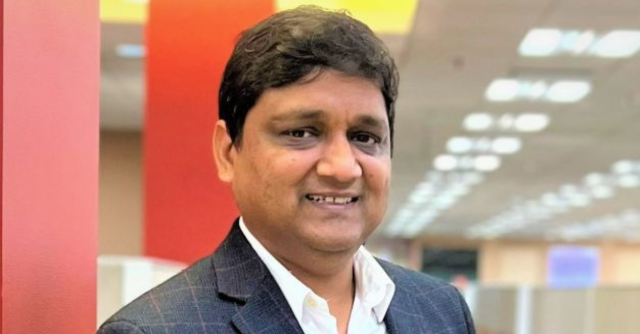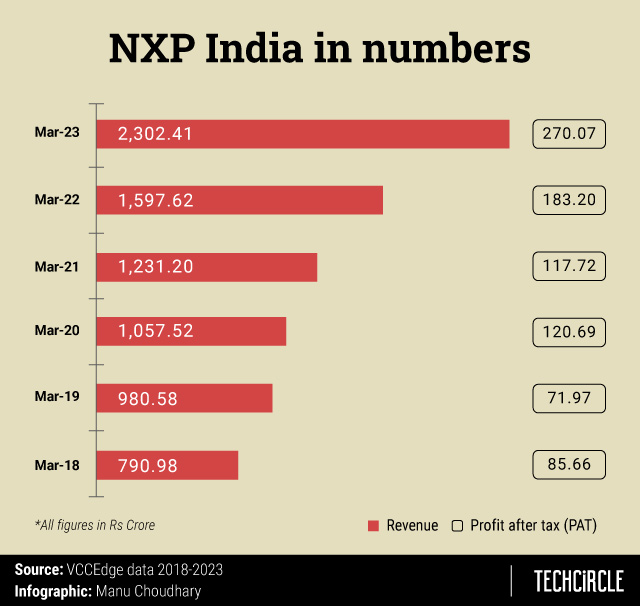
NXP’s India designing team is driving high growth for the global chipmaker


NXP Semiconductors, once part of Royal Philips NV that gobbled Motorola spinoff Freescale to create one of the largest semiconductor companies in the world nine years ago, has accelerated its growth in India last year.
NXP India that derives much of its revenues from designing services via four centres in the country located at Noida, Bengaluru, Pune and Hyderabad, grew its revenues 44% last year to ₹2,302 crore with net profit rising a tad faster, as per information collated by data research platform VCCEdge.


Formerly known as Freescale Semiconductor India Private Limited, the entity was established after NXP Semiconductors acquired Freescale Semiconductor products in 2015. It focuses on developing semiconductor solutions for various applications, including automotive, industrial, consumer, and Internet of Things (IoT) markets.
NXP operates six front-end manufacturing sites and four assembly and test sites worldwide. With over 34,500 team members in more than 30 countries, NXP India serves as one of the company's largest R&D Design centres, employing over 4,000 engineers across four locations.
The Indian engineers at NXP are working on innovations across all business lines, including Advanced Analog, Automotive Processing, Connectivity & Security, Edge Processing, and Radio Frequency Processing. With over 500 patents, NXP India is dedicated to driving innovation in the Automotive, IoT, Industrial IoT, and mobile markets, establishing itself as one of the most innovative teams globally.

The company is reportedly strengthening the local manufacturing ecosystem by developing applications such as 4G/5G, electric vehicles, e-metering for electricity boards, e-passports, transportation ticketing cards, and so on. It is also involved in nurturing startups through programs like the Startup Incubation Initiative.
In addition, NXP is actively engaged in fostering India's future skilled workforce through collaborations between industry and academia. The company has established connections with university faculty and students to provide technical insights into contemporary topics of interest in the semiconductor and electronics ecosystem.
Notably, NXP has entered into Memorandums of Understanding (MoUs) with prestigious universities like IISc Bangalore, IIIT Hyderabad, IIT Madras, IIT Guwahati, MIT Manipal, Thapar, and SIT Tumkur. These partnerships aim to offer lab infrastructure for growth and enhance the engineering and design skills of students.

According to Invest India's estimates, the domestic semiconductor market had a value of around $23.2 billion in 2023. It is projected to reach $80.3 billion by 2028, with a compound annual growth rate (CAGR) of 17% during the forecast period. This significant growth is expected to be primarily driven by key government initiatives such as the Production Linked Incentive (PLI) scheme for the electronics sector, Design Linked Incentive (DLI) scheme, Chips to Startup (C2S), and Scheme for Promotion of Electronic Components and Semiconductors (SPECS), among others.
In March 2023, Kurt Sievers, the President and Chief Executive Officer of NXP, held a meeting with Prime Minister Narendra Modi to discuss the potential of emerging semiconductor technology in India. The focus of their discussion revolved around NXP's vision to expand its research and development capacity in India and incorporate more Indian engineers into its workforce.
Sievers also expressed his intention to encourage NXP's partners to establish fabrication facilities in India. Additionally, he identified industrial automation and healthcare as two promising sectors, alongside the already heavily invested automotive industry, for NXP's future endeavours.

NXP’s high pitched growth in the country last year is in sync with larger peers in the chip business Intel and AMD that also recorded 25% and 54% growth, respectively, last financial year.
